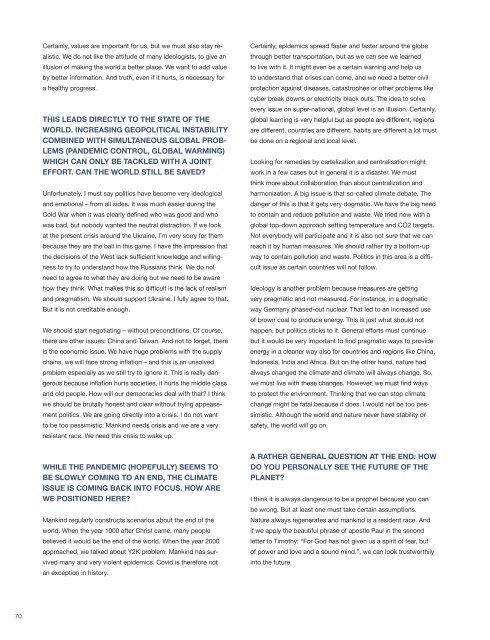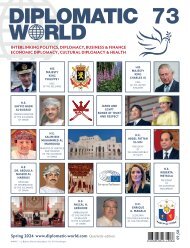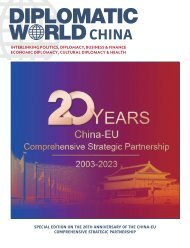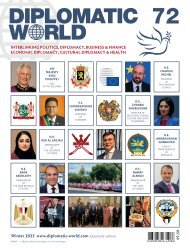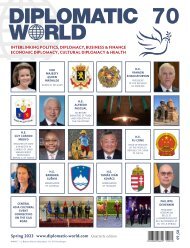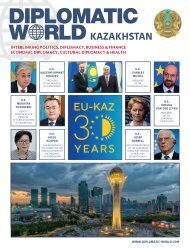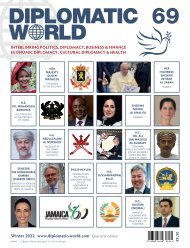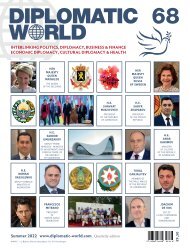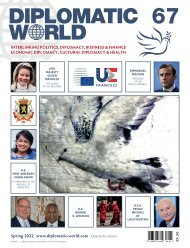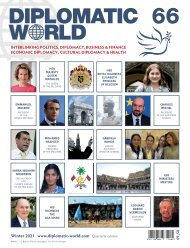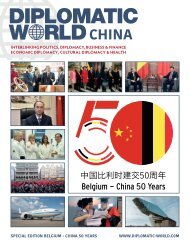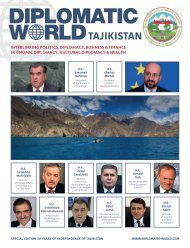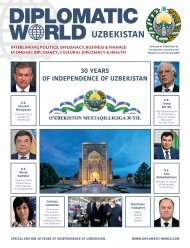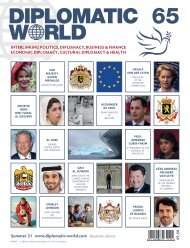Diplomatic World 67
You also want an ePaper? Increase the reach of your titles
YUMPU automatically turns print PDFs into web optimized ePapers that Google loves.
Certainly, values are important for us, but we must also stay realistic.<br />
We do not like the attitude of many ideologists, to give an<br />
illusion of making the world a better place. We want to add value<br />
by better information. And truth, even if it hurts, is necessary for<br />
a healthy progress.<br />
THIS LEADS DIRECTLY TO THE STATE OF THE<br />
WORLD. INCREASING GEOPOLITICAL INSTABILITY<br />
COMBINED WITH SIMULTANEOUS GLOBAL PROB-<br />
LEMS (PANDEMIC CONTROL, GLOBAL WARMING)<br />
WHICH CAN ONLY BE TACKLED WITH A JOINT<br />
EFFORT. CAN THE WORLD STILL BE SAVED?<br />
Unfortunately, I must say politics have become very ideological<br />
and emotional – from all sides. It was much easier during the<br />
Cold War when it was clearly defined who was good and who<br />
was bad, but nobody wanted the neutral distraction. If we look<br />
at the present crisis around the Ukraine, I’m very sorry for them<br />
because they are the ball in this game. I have the impression that<br />
the decisions of the West lack sufficient knowledge and willingness<br />
to try to understand how the Russians think. We do not<br />
need to agree to what they are doing but we need to be aware<br />
how they think. What makes this so difficult is the lack of realism<br />
and pragmatism. We should support Ukraine. I fully agree to that.<br />
But it is not creditable enough.<br />
We should start negotiating – without preconditions. Of course,<br />
there are other issues: China and Taiwan. And not to forget, there<br />
is the economic issue. We have huge problems with the supply<br />
chains, we will face strong inflation – and this is an unsolved<br />
problem especially as we still try to ignore it. This is really dangerous<br />
because inflation hurts societies, it hurts the middle class<br />
and old people. How will our democracies deal with that? I think<br />
we should be brutally honest and clear without trying appeasement<br />
politics. We are going directly into a crisis. I do not want<br />
to be too pessimistic. Mankind needs crisis and we are a very<br />
resistant race. We need this crisis to wake up.<br />
WHILE THE PANDEMIC (HOPEFULLY) SEEMS TO<br />
BE SLOWLY COMING TO AN END, THE CLIMATE<br />
ISSUE IS COMING BACK INTO FOCUS. HOW ARE<br />
WE POSITIONED HERE?<br />
Mankind regularly constructs scenarios about the end of the<br />
world. When the year 1000 after Christ came, many people<br />
believed it would be the end of the world. When the year 2000<br />
approached, we talked about Y2K problem. Mankind has survived<br />
many and very violent epidemics. Covid is therefore not<br />
an exception in history.<br />
Certainly, epidemics spread faster and faster around the globe<br />
through better transportation, but as we can see we learned<br />
to live with it. It might even be a certain warning and help us<br />
to understand that crises can come, and we need a better civil<br />
protection against diseases, catastrophes or other problems like<br />
cyber break downs or electricity black outs. The idea to solve<br />
every issue on super-national, global level is an illusion. Certainly,<br />
global learning is very helpful but as people are different, regions<br />
are different, countries are different, habits are different a lot must<br />
be done on a regional and local level.<br />
Looking for remedies by cartelization and centralisation might<br />
work in a few cases but in general it is a disaster. We must<br />
think more about collaboration than about centralization and<br />
harmonization. A big issue is that so-called climate debate. The<br />
danger of this is that it gets very dogmatic. We have the big need<br />
to contain and reduce pollution and waste. We tried now with a<br />
global top-down approach setting temperature and CO2 targets.<br />
Not everybody will participate and it is also not sure that we can<br />
reach it by human measures. We should rather try a bottom-up<br />
way to contain pollution and waste. Politics in this area is a difficult<br />
issue as certain countries will not follow.<br />
Ideology is another problem because measures are getting<br />
very pragmatic and not measured. For instance, in a dogmatic<br />
way Germany phased-out nuclear. That led to an increased use<br />
of brown coal to produce energy. This is just what should not<br />
happen, but politics sticks to it. General efforts must continue<br />
but it would be very important to find pragmatic ways to provide<br />
energy in a cleaner way also for countries and regions like China,<br />
Indonesia, India and Africa. But on the other hand, nature had<br />
always changed the climate and climate will always change. So,<br />
we must live with these changes. However, we must find ways<br />
to protect the environment. Thinking that we can stop climate<br />
change might be fatal because it does. I would not be too pessimistic.<br />
Although the world and nature never have stability or<br />
safety, the world will go on.<br />
A RATHER GENERAL QUESTION AT THE END: HOW<br />
DO YOU PERSONALLY SEE THE FUTURE OF THE<br />
PLANET?<br />
I think it is always dangerous to be a prophet because you can<br />
be wrong. But at least one must take certain assumptions.<br />
Nature always regenerates and mankind is a resident race. And<br />
if we apply the beautiful phrase of apostle Paul in the second<br />
letter to Timothy: “For God has not given us a spirit of fear, but<br />
of power and love and a sound mind.”, we can look trustworthily<br />
into the future.<br />
In a world that has returned to great power rivalry, understanding<br />
the grand strategy of these powers is crucial. This book introduces<br />
ten key terms for analysing grand strategy and shows how<br />
the world’s great powers – the United States, China, Russia and<br />
the European Union (EU) – shape their strategic decisions today.<br />
Outlining the steps needed for a less confrontational grand strategy<br />
and a more peaceful and stable world order, this lively and<br />
accessible introduction shows how the choices made in each of<br />
these ten areas will determine the course of world politics in the<br />
first half of the 21st century.<br />
Sven Biscop is Director of the Europe in the <strong>World</strong> Programme at<br />
the Egmont–Royal Institute for International Relations in Brussels<br />
and Professor at Ghent University. He is an Honorary Fellow<br />
of the European Security and Defence College (ESDC), and an<br />
Officer in the Order of the Crown of the Kingdom of Belgium.<br />
THE PROGRESSIVE POST<br />
This is a timely analysis that – crucially – also manages to feel<br />
both very real for the time it is written and future-proof in terms<br />
of the insights it includes and the lessons it uncovers… a great<br />
contribution to the global debates around the current and future<br />
dynamics of great power politics.<br />
JOURNAL OF COMMON MARKET STUDIES<br />
Elegant and sophisticated .<br />
BEATRICE HEUSER, UNIVERSITY OF GLASGOW<br />
A leading European expert giving wise counsel to strategy<br />
makers on both sides of the Atlantic, for a community of values<br />
that has choppy waters behind it, likely to face further rough seas<br />
ahead. Strongly recommended empirically-derived navigation<br />
aids for practitioners!<br />
GENERAL SIR RUPERT SMITH KCB DSO OBE QGM<br />
An excellent and readable book. His analysis is clear and his<br />
suggestions for the future pertinent. He provides a comprehensive<br />
framework for understanding strategies in general, let alone<br />
the Grand Strategies of major powers.<br />
GRAND STRATEGY<br />
AND GREAT POWER POLITICS<br />
PROFESSOR SVEN BISCOP<br />
BARRY R. POSEN, MASSACHUSETTS INSTITUTE<br />
OF TECHNOLOGY<br />
A timely work accessible to practitioners, illuminating to scholars,<br />
and instructive to students....elegantly combines theory, history,<br />
and current-policy analysis to provide not only a primer on Grand<br />
Strategy, but a guide to how to mobilize the concept to understand<br />
and navigate an increasingly multi-polar world.<br />
HAL BRANDS, JOHNS HOPKINS UNIVERSITY AND<br />
AMERICAN ENTERPRISE INSTITUTE<br />
This book is both a conceptual treatment of grand strategy and a<br />
prescriptive argument about 21st century geopolitics. While I do<br />
not agree with all of its conclusions, I believe all readers will find<br />
it most stimulating.<br />
BRENDAN SIMMS, UNIVERSITY OF CAMBRIDGE<br />
At a time when it faces a double ‘no deal’ on Brexit and the<br />
Coronavirus Recovery Plan, the European Union badly needs a<br />
strategy. Sven Biscop, who has spent his entire career analysing<br />
the Union’s strengths and weakness is well-placed to help her to<br />
start thinking about one. My recommendation can be summarised<br />
in fewer than ten words: ‘buy this book’.<br />
70 71


